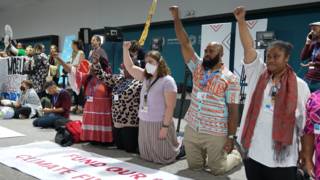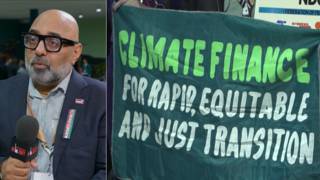
Related
In the acclaimed new book Gaza Faces History, historian Enzo Traverso challenges Western attitudes toward Israel’s ongoing genocide in Gaza by reckoning with the larger historical context of the Holocaust and the Nakba. Traverso details how memorializing the Holocaust became a sort of “civil religion” that honored human rights and the values of Western liberal democracies after the Second World War. However, in recent decades, Traverso warns, “the memory of the Holocaust experienced a paradoxical metamorphosis, and it was weaponized by Israel and by most Western powers in order to become a policy of an unconditional support of Israeli occupation of the Palestinian territories.” Witnessing this distortion of history, “I was shocked by the way in which many words, many concepts had been abused and misunderstood,” says Traverso. “Now we are facing a paradoxical situation in which the perpetrator is Hamas and the Palestinians, and the victims are the Israelis. And this is a reversal of reality.”
Transcript
AMY GOODMAN: This is Democracy Now!, democracynow.org, “War, Peace and the Presidency.” I’m Amy Goodman, broadcasting from PBS12 in Denver. Nermeen Shaikh is in New York.
NERMEEN SHAIKH: We end today’s show with the acclaimed historian Enzo Traverso, author of the new book Gaza Faces History. One reviewer has said the book offers, quote, “a devastating indictment of the rhetorical subterfuge by which Israel and its supporters in the West have justified Gaza’s slaughter.”
AMY GOODMAN: Enzo Traverso joins us from Ithaca, New York, where he teaches at Cornell University. His other books include The Origins of Nazi Violence and The New Faces of Fascism: Populism and the Far Right.
Professor Enzo Traverso, welcome to Democracy Now! Your field of study has been fascism, the Nazis. Talk about why you’re now taking on Gaza.
ENZO TRAVERSO: Thank you. Thank you for having me.
Yeah, I’m a historian of modern European history. I was deeply affected by what is happening in Gaza now, like everyone, but I am not a scholar of the Middle East. And at the beginning, I did not think to write a book on this war and this genocide. But I quickly realized that history, and even a lot of words, a semantic, related to the history of wars, the history of violence and genocides, and that European history itself was hugely mobilized in order to interpret the Gaza war. And I was shocked by the way in which many words, many concepts had been abused and misunderstood, and mislead, concepts like pogroms, Holocaust, antisemitism, Zionism. And so, facing such misunderstanding of reality, so I thought it was important to clarify the meaning of such concepts.
NERMEEN SHAIKH: Professor Traverso, you begin the book by citing Sebald’s extraordinary work, On the Natural History of Destruction, in which he tries to understand, in part, why after the devastating aerial bombardments of German cities at the end of the Second World War, there was scarcely a word spoken by German survivors of those aerial assaults. Could you speak about how you use this as a kind of premise and how that one should interpret what’s happened after October 7th through that lens, the way in which victims and perpetrators have represented — how victims and perpetrators have been represented in the conflict?
ENZO TRAVERSO: Yeah. I open my book quoting this great German writer, W. G. Sebald, who pointed out how at the end of the Second World War Germans were silent about their own sufferings, which were uncontestable. So, German civil society had been destroyed by the Allied bombings. But this silence was related to the awareness that when Germans suffered these war crimes, Nazi Germany was perpetrating the Holocaust and worse crimes in Europe, particularly on the Eastern Front. And, well, at the end of the Second World War, the Nuremberg trial judged the Nazi crimes. And only many decades later, the German suffering during the Second World War were acknowledged, without appearing as a kind of exculpation or of relativization of Nazi crime.
Now we are facing a paradoxical situation in which the perpetrator is Hamas and the Palestinians, and the victims are the Israelis. And this is a reversal of reality. It’s like a Nuremberg trial in which, instead of the Nazi crimes, were judged the Allied atrocities perpetrated by the U.S. and the U.K. aircrafts.
NERMEEN SHAIKH: And, Professor Traverso, could you explain why you think that this memory of the Holocaust, the way in which the Holocaust has been deployed since October 7th, is actually a desecration of the Holocaust itself? If you could elaborate on that point and why you think it’s been used for these ends by so many?
ENZO TRAVERSO: Yeah. The memory of the Holocaust was subterranean and underground, an occulted memory for decades after the Second World War. But through a very difficult and painful process of working through the past, the memory of the Holocaust became a central element of, a pillar of the, not only Western, but global memorial landscape. We cannot think of the 20th century without locating the Holocaust at the center of this picture. And the memory of the Holocaust had — so, I write in my book that it became a kind of civil religion of our liberal democracies and used in order to celebrate human rights and some fundamental values of our democracies. The Holocaust memory was extremely important as a kind of paradigm in order to elaborate the memory of other forms of violence and genocide.
But during the last decades — I would say two last two decades — the memory of the Holocaust experienced a paradoxical metamorphosis, and it was weaponized by Israel and by most Western powers in order to become a policy of an unconditional support of Israeli occupation of the Palestinian territories. And this has extremely dangerous consequences, because today we are facing a dramatic, a tragic situation in which the memory of the Holocaust is invoked and claimed in order to justify a war in Gaza which is taking genocidal features. And this means that the memory of the Holocaust is completely perverted.
And think of the possible consequences of that. Those who are protesting against this genocidal war are accused of antisemitism. But if the memory of the Holocaust is mobilized to defend unconditionally a genocidal policy, maybe people could think that the memory of the Holocaust is intrinsically bad. If criticizing a genocide is antisemitism, many people would think that antisemitism is not so bad. And finally, many people would start thinking that the Holocaust itself is a myth invented by Israel in order to justify its politics of occupation of the Palestinian territories and of oppression. So, I fear, I worry that in the long view, maybe not immediately, but people who are claiming an unconditional defense of Israeli occupation and war in the name of the struggle against antisemitism and in the name of the memory of the Holocaust are preparing a new wave of antisemitism.
AMY GOODMAN: Professor Enzo Traverso, before we end today’s show, I wanted to ask you about the victory of Trump. You’ve said what astonished you was not his winning, but the extent of his winning. One of your previous books is titled The New Faces of Fascism: Populism and the Far Right. If you could elaborate on this?
ENZO TRAVERSO: Yeah, in this book, I proposed the category of post-fascism in order to depict this very large and heterogeneous constellation of radical right, extreme right, fascist and radical nationalist movements and parties, which are rising on a global scale. And Trump is not an exception. Trump is part of this global phenomenon. And I used this concept of post-fascism because, for evident reasons, we live in a different context with respect to the age of classical fascism, and because there are many uncontestable differences between Donald Trump or Milei in Argentina or Marine Le Pen in France or Giorgia Meloni in Italy and classical fascism, from this point of view, so it’s something different with respect to fascism. But at the same time, we cannot approach and interpret this new political phenomenon without comparing it with classical fascism. It’s something transitional between fascism and something unknown, which is emerging. Well, there is a debate in the United States about —
AMY GOODMAN: We just have 20 seconds, I hate to say to you. Professor, we just have 20 seconds.
ENZO TRAVERSO: Yeah. So, I said I have no difficulties to depict Trump as a fascist. He proved that he is ready to transgress the basic features of democracy, contesting the outcome of the election. But this kind of fascism is not a meteor that’s suddenly falling —
AMY GOODMAN: We have to leave it there, but we are looking forward to doing an extended interview when you come to New York City. Cornell professor Enzo Traverso is author of the new book Gaza Faces History.
And that does it for today’s show. We’ve been broadcasting here in Denver at the studios of PBS12 at the Five Points Media Center, which is also home to Free Speech TV. Thanks to the folks here at PBS12: Bobby Springer, Mary Latsis and the whole crew. Next week, we’ll be broadcasting from Baku, Azerbaijan, the U.N. climate summit. I’m Amy Goodman, with Nermeen Shaikh.











Media Options